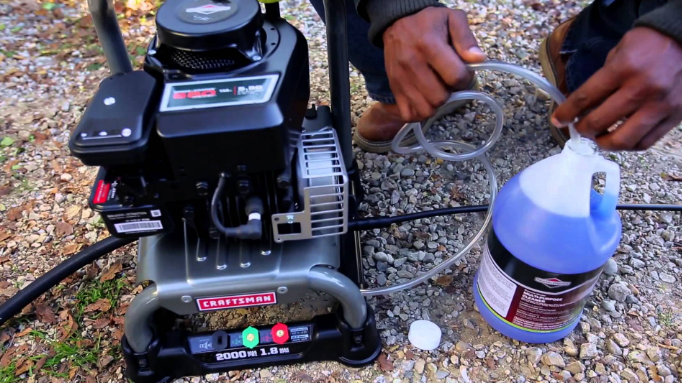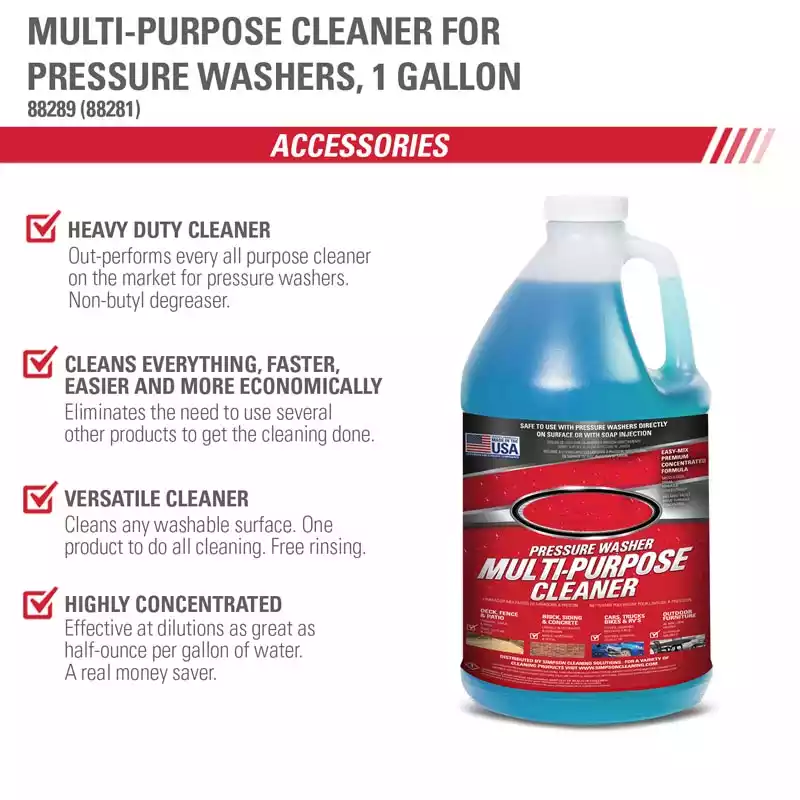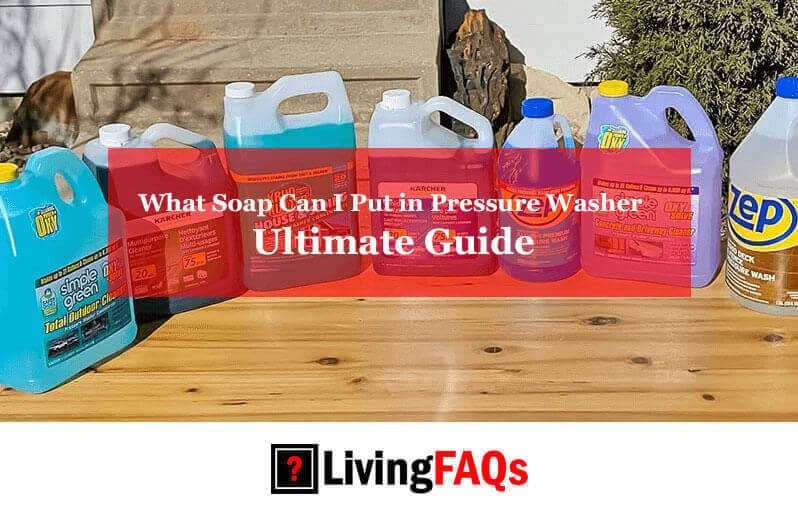Only use detergents specifically designed for pressure washers in your machine. Other soaps can damage the equipment or be ineffective at cleaning.
Choosing the right soap for your pressure washer is essential to ensure effective cleaning while maintaining the integrity of your machine. Pressure washers require particular types of detergents that are formulated to be low-sudsing and safe for use with the high-pressure system.
These specialized detergents can tackle grime, dirt, and stains without harming the pressure washer’s internal components. They are also designed to be eco-friendly and easily rinsed away without leaving harmful residues. Using the correct soap helps you avoid unnecessary wear on your equipment, ensuring it lasts longer and performs better. Always consult your pressure washer’s manual for recommended detergent types to ensure compatibility and optimal cleaning results.
Introduction To Pressure Washers And Soap Usage
Have you ever wondered about the right soap for your pressure washer? Pressure washers are powerful tools. They clean surfaces with ease. Soap plays a critical role in this process. Let’s delve into how to use them effectively.
Essentials Of Pressure Washing
Pressure washers require specific soaps. These soaps must be safe for use. They should not damage the washer’s parts. Always check the manufacturer’s recommendations. This ensures optimal performance and longevity.
- Match soap type to your pressure washer.
- Consider the surface you are cleaning.
- Use only recommended detergents.
Role Of Soap In Pressure Cleaning
Soap enhances cleaning power. It breaks down dirt and grime. This allows for easier removal. Choose a soap based on the task at hand. Biodegradable options are better for the environment.
- Soap targets tough stains.
- It works with the water’s force.
- Eco-friendly soaps protect nature.

Credit: www.aspenpowerwashing.com
Types Of Pressure Washer Soaps
Choosing the right soap for your pressure washer is crucial. Different tasks call for specific types of soaps. Here, explore the most common ones.
General Purpose Detergents
General purpose detergents are the go-to for regular cleaning. These soaps are safe on most surfaces. They tackle dirt and mild grime effectively.
- Multipurpose for various cleaning tasks
- Perfect for home exteriors and outdoor furniture
- Gentle on plants and animals
Vehicle Wash Soaps
Vehicle wash soaps are specially formulated for cars, trucks, and boats. They protect paint and finish. These soaps remove road grime and bugs with ease.
- Includes wax for a shiny finish
- Safe on paint, chrome, and glass
- Prevents water spots and streaks
Heavy-duty Degreasers
For tough grease and oil stains, heavy-duty degreasers work best. They cut through the grime found in garages and on driveways.
- Great for engines and machinery
- Removes oil stains and grease
- Use with care, as they’re powerful
Criteria For Selecting The Right Soap
Choosing the right soap for your pressure washer is key. The right soap makes cleaning easy and safe. Here are criteria to help you pick the best soap.
Soap Ingredients And Surfaces
The soap ingredients matter a lot. Some ingredients harm certain surfaces. For example, strong chemicals can damage your car’s paint. Always check the soap’s label. Look for soaps that are safe for your cleaning needs. Biodegradable soaps are best for most surfaces.
Pressure Washer Compatibility
Not all soaps work with every pressure washer. Some soaps are for specific models. Your pressure washer’s manual will list compatible soaps. Using the right soap protects your machine. It also ensures the soap works as expected. Always follow your pressure washer’s guidelines.
Environmental Considerations
Think about the planet when choosing soap. Eco-friendly soaps are better. They harm less and break down easily. Look for labels like “phosphate-free” or “biodegradable.” These soaps clean well and protect nature. Using them helps keep our waterways clean.
- Check soap ingredients for safe cleaning.
- Use soaps compatible with your pressure washer.
- Choose eco-friendly soaps to protect the environment.
Diy Soap Solutions For Pressure Washers
Are you thinking about making your own soap for your pressure washer? You’re in the right place! DIY soap solutions are easy to make. They save money and are kind to our planet. Let’s dive into how you can create your own soaps at home.
Homemade Soap Recipes
Making soap for your pressure washer is simple and fun. Here are two recipes to try:
- Basic Cleaning Solution: Mix 1 gallon of water with 1/3 cup of laundry detergent. Add 2/3 cup of a general cleaner like Simple Green. This mix is great for general cleaning tasks.
- Heavy Duty Cleaner: For tougher jobs, mix 1 gallon of hot water with 1 cup of powdered laundry detergent and 1 cup of bleach. This powerful mix can tackle greasy or stained surfaces. Remember to wear gloves and a mask for safety.
Natural Ingredients For Eco-friendly Cleaning
Eco-friendly cleaning is important. It protects our earth. Here are some natural ingredients you can use:
- Vinegar: It’s a natural disinfectant. It works well on mildew and mold.
- Baking Soda: Great for scrubbing. It removes tough dirt without scratching surfaces.
- Castile Soap: A plant-based soap. It’s safe for gardens and outdoor spaces.
Combine these ingredients with water for a safe, effective soap. For example, mix 1 gallon of water with 1 cup of vinegar and 1/4 cup of Castile soap. This solution is perfect for windows and siding.
| Ingredient | Use | Benefits |
|---|---|---|
| Vinegar | Disinfectant | Natural, fights mildew |
| Baking Soda | Scrubbing | Non-scratch, cleans deeply |
| Castile Soap | General Cleaning | Eco-friendly, safe for plants |
Remember, DIY soap solutions for pressure washers are not only cost-effective but also better for our planet. With a few simple ingredients, you can create powerful cleaning solutions that keep your home sparkling and green.
Commercial Soap Vs. Diy Solutions
Choosing the right soap for your pressure washer is crucial. Commercial soaps and DIY solutions both clean, but differently. Let’s explore how they stack up against each other.
Efficacy Comparison
Commercial soaps are designed for pressure washers. They break down dirt and grime efficiently. DIY solutions can be effective, but may lack consistency. The cleaning power varies with ingredients and mix ratios.
Cost-benefit Analysis
Let’s compare costs and benefits. Commercial soaps might seem pricier. They offer reliable results and safety for your machine. DIY solutions cost less. They use household items. But, they risk damaging your pressure washer.
| Aspect | Commercial Soap | DIY Solution |
|---|---|---|
| Cost | Higher | Lower |
| Efficacy | Consistent | Variable |
| Risk to Equipment | Lower | Higher |
Applying Soap With Pressure Washers
Using the right soap in a pressure washer boosts cleaning power. Many tasks need soap for a deep clean. Not all soaps suit pressure washers. Some can harm the machine. Others won’t clean well. This post guides you on applying soap with pressure washers.
Best Practices For Soap Dispensing
Right soap use ensures efficient cleaning. Follow these practices:
- Choose compatible soaps: Use soaps made for pressure washers.
- Check the machine’s manual: It lists recommended soaps.
- Dilute correctly: Follow the soap’s instructions for water mixing.
- Fill the soap tank: Some washers have onboard tanks for soap.
- Attach soap nozzles: They help apply soap at lower pressure.
- Apply from bottom to top: Prevents streaks.
- Rinse thoroughly: Use clean water after soaping.
Adjusting Pressure For Soap Application
Adjusting pressure is key for applying soap. Use these tips:
- Start low: Begin with the lowest pressure setting.
- Use the right nozzle: Black tip nozzles are often for soap.
- Test on a small area: Check the soap’s impact first.
- Increase as needed: Only up the pressure if necessary.
Remember, high pressure can strip paint or damage surfaces. Always start gentle.
Safety Precautions When Using Soaps
Using the right soap in your pressure washer is crucial. It ensures your cleaning task goes smoothly and safely. But, safety always comes first. Let’s talk about how to stay safe while using soaps in your pressure washer.
Personal Protective Equipment
Before you start, gear up for safety. Wearing personal protective equipment (PPE) is a must. This includes:
- Gloves to protect your hands from harsh chemicals.
- Goggles to keep your eyes safe from splashes.
- Boots to prevent slips and protect your feet.
- Long-sleeved clothing to shield your skin.
Handling Chemical Soaps Responsibly
Chemical soaps can be tough on dirt, but they need careful handling. Follow these steps:
- Read the soap’s label before use. It tells you how to use it safely.
- Use only the recommended amount. More soap doesn’t mean more clean.
- Store soaps in a cool, dry place. Keep them away from children and pets.
- Dispose of empty containers properly. Protect the environment.
Remember, safety ensures that your cleaning task ends as well as it begins. Always prioritize it.

Credit: m.youtube.com
Troubleshooting Common Soap Issues
When using a pressure washer, selecting the right soap is crucial. Sometimes, the soap may not work as expected. Let’s dive into common soap issues and fix them.
Residue And Streaks Post-cleaning
Residue and streaks can be frustrating after cleaning. These issues often stem from incorrect soap choice or improper rinsing.
To tackle these, follow these steps:
- Check soap compatibility with your pressure washer and surface.
- Rinse thoroughly to remove all soap traces.
- Use a lower pressure setting for a final rinse.
This ensures a clear, streak-free finish.
Pressure Washer Soap Injector Problems
The soap injector is key for mixing soap with water. Problems can stop soap flow.
Common injector issues:
| Problem | Solution |
|---|---|
| Clogged injector | Clean with a needle or replace. |
| Worn seals | Replace seals to prevent leaks. |
| Incorrect nozzle size | Use the right size for soap suction. |
Regular maintenance keeps the injector working well.
Conclusion And Best Practices Recap
Our discussion on the right soap for pressure washers now wraps up.
Let’s recap the best practices to keep in mind.
Summarizing Key Takeaways
- Check manufacturer recommendations before choosing soap.
- Use biodegradable detergents to protect the environment.
- Pressure washer-specific solutions ensure compatibility.
Maintaining Your Pressure Washer For Optimal Performance
- Clean the machine after each soap use.
- Store in a dry, safe place to avoid damage.
- Regularly check for hose and nozzle issues.
Follow these tips to make your pressure washer last longer and work better.

Credit: clarionmunicipal.com
Frequently Asked Questions
Can I Use Any Soap In My Pressure Washer?
No, not all soaps are suitable for use in pressure washers. It’s important to use detergents specifically designed for pressure washers to avoid damaging the machine and ensure effective cleaning. These are often biodegradable and won’t harm plants or animals.
What Type Of Soap Is Best For Pressure Washers?
High-efficiency, vehicle-safe soaps are ideal for pressure washers. Look for soaps labeled as pressure washer-safe. These soaps produce minimal suds but effectively remove dirt and grime, ensuring they won’t damage your pressure washer’s components.
How Do I Mix Soap For A Pressure Washer?
Mix soap for a pressure washer by following the manufacturer’s instructions. Typically, you’ll dilute the soap with water in the washer’s detergent tank. A common ratio is 1 part soap to 7 parts water, but this can vary.
Can I Make My Own Pressure Washer Soap?
Yes, you can make your own pressure washer soap for general cleaning by mixing water with a mild detergent like dish soap. However, homemade solutions may not be as effective for tough stains or suitable for all surfaces. Always test a small area first.
Conclusion
Selecting the right soap for your pressure washer is crucial. It ensures a thorough clean while protecting your equipment. Remember, choosing a detergent specific to your task and machine type is key. For optimal results, always follow the manufacturer’s recommendations.
Clean smarter, not harder, with the perfect soap choice.

